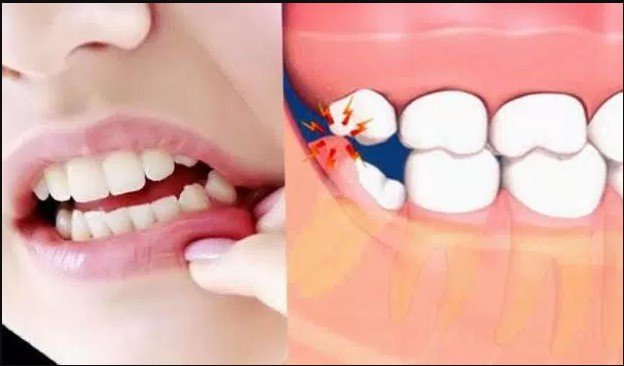Definition
What is a tooth abscess?
Tooth abscess is a disease in which pus accumulates in the teeth due to infection.
There are three types of dental abscesses:
- Gingival abscesses occur only in gum tissue and do not affect the teeth or ligaments of the gums.
- Periodontal abscess usually begins from the structure of adjacent bone tissue around the tooth.
- A periapical abscess occurs when pus joins on the tooth root.
Tooth abscess usually requires treatment. If left untreated, his condition will get worse and result in damaged bone tissue.

tooth abscess
Signs & symptoms
What are the signs and symptoms of dental abscesses?
- Pain in the affected area of
the abscess, especially when biting or being touched - So sensitive to fluids and hot and cold temperatures
- Pain
- The mouth was not tasty
- Fever
- Unwell
- It's hard to open your mouth
- Difficult to swallow (dysphagia)
- Insomnia
The main symptom of dental abscess is pain. It may be throbbing and very painful. This pain can appear suddenly and will get worse at night. In certain cases, the pain can spread to the ears, jawbone, and neck.
There may still be other symptoms that have not been mentioned. If you are worried about certain symptoms, contact your doctor immediately.
When should I see a doctor?
If you experience any of the above-mentioned symptoms or you have a specific question, talk to your doctor immediately. Everyone's body is different, so discuss with your doctor to get the best diagnosis and treatment method for you.
Cause
What causes dental abscess?
Most dental abscesses occur as a dental and oral infection complication. Evil bacteria that usually live in plaque will infect and look for pathways to attack teeth.
Periapical abscess
Bacteria enter the tooth through small holes caused by caries. Caries are formed on tooth enamel (the outer layer of hard teeth). The caries eventually break down the tissue under the tooth enamel, called dentin.
If this continues to happen, eventually the hole will get to the soft tooth called pulp. Pulp infection is called pulpitis.
Along with the development of pulpitis, bacteria will penetrate the bone supporting the teeth, called the alveolar bone to form a periapical abscess.
Gums abscess
Bacteria that live in plaque can infect the gums, causing periodontitis. The gums will then become inflamed, so the gum ligaments (the tissue surrounding the tooth root) will be released from the tooth.
The release of gum ligaments will create a small hole that is easy to get dirty and difficult to clean. The more bacteria that live in the hole, the gum abscess will occur.
Gum abscess can be caused by the formation of holes in the gums due to dental surgery or other medical procedures on the teeth and mouth. In addition, the use of antibiotic drugs for periodontitis can also hide the symptoms of an abscess. Even in some cases, gum damage can lead to a gum abscess despite not having periodontitis.
Medication and treatment
The information provided is not a substitute for medical advice. ALWAYS consult your doctor.
How are tooth abscesses treated?
Only dentists can handle dental abscesses. Treatment may include procedures in general. In some cases, you may need surgery.
Incision drainage incision
The abscess that appears should be slashed open so that pus that contains bacteria can come out and dry. For this procedure, you may be given a local anesthetic.
Treatment of periapical abscess
Root canal treatment can eliminate abscesses. Teeth that die will be perforated so that pus can come out. The damaged tissue will be removed from the dental pulp. Then, to prevent infection, the perforated part will be patched.
The abscess will dry out and the hole is cleaned. The root surface of the tooth will be smoothed by scaling under the edge of the gum. This will help teeth heal quickly while preventing infection.
Surgery for dental abscess
Patients with frequent dental and infant abscesses may have surgery to remove damaged tissue. Usually this procedure is performed by an oral surgical dentist.
If the tooth abscess still occurs again after surgery, the tooth may be revoked.
Treating pain
Over-the-counter painkillers can help relieve pain. However, read the information on the medicine package. Remember, pain medication can only help control pain, not cure disease. You still have to go to the dentist.
Drugs that may be consumed include aspirin, ibuprofen, or paracetamol (acetaminophen). However, some drugs are not recommended for patients with certain conditions.
Ibuprofen is not recommended for people with asthma and peptic ulcers.
Aspirin should not be given to children under 16, pregnant women, or women who are breastfeeding.
Treatment at home
What are the lifestyle changes or home remedies that can be done to treat dental abscesses?
Here are the lifestyle and home remedies that can help you cope with dental abscesses.
- Avoid hot foods or drinks
- Avoid cold foods or drinks
- Chew food on the side of the mouth that is not too sick
- Do not clean teeth with floss in the diseased area
- Use a toothbrush with a very soft bristle brush.
If you have any questions, consult your doctor for the best solution of your problem.